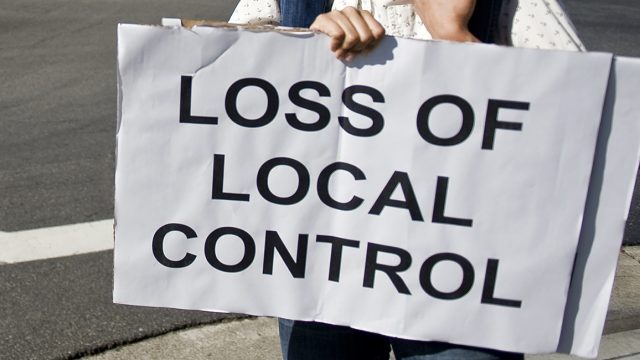There's Nothing "Conservative" About Common Core Standards

Yesterday the House Education Committee, after listening to five hours of debate, gave a 9-4 “do not pass” recommendation to HB1461. That’s legislation introduced by Rep. Jim Kasper to withdraw North Dakota from the Smarter Balance Consortium and thus the Common Core standards which that organization is implementing.
The debate over Common Core has been…colorful. Committee members – both for and against Common Core – have expressed a degree of chagrin at the tenor of some activists on both sides. Regrettably, I’m told that some Common Core opponents even took to mocking committee members by making faces and hand gestures as the legislation was discussed. Leah Peterson, one of the organizers of the anti-Common Core activists, emailed me to explain that the people engaging in these antics were not representative of her group. “I was made aware of some unruly behavior by one or two associated with our group,” she told me. “Please know that they are the fringe and do not represent our group as a whole. I would not have tolerated that behavior had I been there.”
[mks_pullquote align=”right” width=”300″ size=”24″ bg_color=”#000000″ txt_color=”#ffffff”]”The problem is not the Common Core standards per se. The problem is how those standards are being implemented as policy.”[/mks_pullquote]
Fair enough. Any political movement of any ideological bent will, once it grows to a certain size, is going to attract a few fringe activists who do more harm than good to the cause. But the childish display by some in the committee chamber is sadly indicative of how much the Common Core debate has been a distraction from what lays at the root of the problem.
The problem is not the Common Core standards per se. The problem is how those standards are being implemented as policy.
Today the Grand Forks Herald lectures conservatives about opposition to Common Core. The paper urges conservatives to “recognize Common Core as the back-to-basics, ‘core knowledge’ approach that conservative reformers have been advocating for years.”
Is that true? Is Common Core really conservative education reform? That might come as a surprise to groups like the Heritage Foundation, which knows a thing or two about conservatism and opposes Common Core, but I honestly feel that ideological argument is irrelevant.
Again, the problem is not necessarily Common Core as policy. The problem is that Common Core represents a one-size-fits all approach to education policy pushed on the states with only a facade of local involvement.
There’s nothing conservative about top-down, one-size-fits-all education policy.
Superintendent Kirsten Baesler, who has made championing Common Core the cause célèbre of her first term in office, has argued that Common Core is a product of consensus among North Dakota educator. This is a falsehood. Common Core may have been rubber-stamped by North Dakota-based educators, but it didn’t originate here. It’s not local policy.
[mks_pullquote align=”left” width=”300″ size=”24″ bg_color=”#000000″ txt_color=”#ffffff”]”How can Common Core be a product of local policymakers when one of the goals of the standards is to make education the same everywhere?”[/mks_pullquote]
In fact, the Common Core supporters themselves undermine their own arguments about localism when they argue that one feature of the policy is that it makes it easier for students moving from state-to-state to find consistent education standards. How can Common Core be a product of local policymakers when one of the goals of the standards is to make education the same everywhere?
Here’s a fact that may surprise you: Rep. Jim Kasper’s bill isn’t really about Common Core. In fact, it wouldn’t even preclude North Dakota from continuing to use the Common Core standards. All his bill does is remove North Dakota from Smarter Balance and establish process by which North Dakota educators and policymakers choose standards for the state on their own.
These people could choose Common Core if they wish. But the decision would be made in the state. Not by an out-of-state consortium with local leaders serving only as a rubber stamp.
If I could sum up the conservative approach to education policy in a word, it would be choice. Technocrats and progressives see a need for uniform education policy. They believe the only thing holding us back from improved academic outcomes is the proper tweaks to the education assembly line. These people see schools as factories, and kids as widgets, and education as something which can be improved in the way Ford Motor Company might improve auto manufacturing.
This is backward. Kids aren’t widgets. Schools shouldn’t be treated like factories. What we need is more choice. Local education officials need to be afforded the flexibility to develop and/or adopt policies that work best for their areas. Parents and students need to be empowered to choose which schools work best for them.
Throughout human history the key to improving any area of social policy has been empowerment. Allow people the maximum number of choices to pursue what is in their own best interest. Not everyone will make the best possible choices for themselves, but most will.
In terms of education policy, that means rejecting national consortiums and instead focusing on how we might empower students, parents, and teachers locally.




